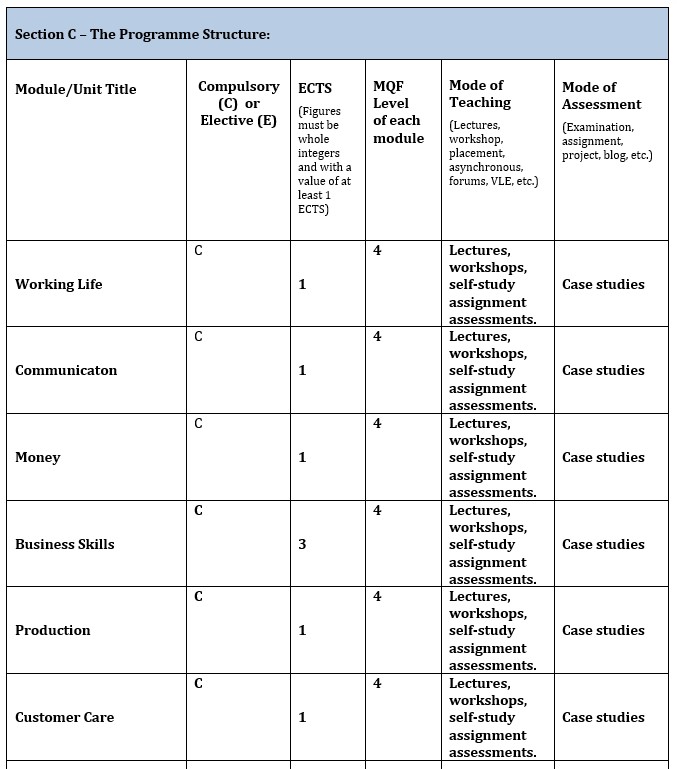Award in Professional Proficiency in English as a Foreign Language
This programme is designed to teach a variety of skills relevant to the world of international business communication and administration.
Intake
November
EQF / MQF Level
Level 4
Mode of Delivery
Traditional
Duration of Course
10 weeks, Full-Time, 9 Hours per Week
Operational End Date
N/A
N/A
ECTS Credits
8 ECTS
Programme Qualifies for
Get Qualified Scheme
Certificate after completing
Student Success Rate
100
Intake
November
EQF / MQF Level
Level 4
Mode of Delivery
Traditional
Duration of Course
10 weeks, Full-Time, 9 Hours per Week
Operational End Date
N/A
N/A
ECTS Credits
8 ECTS
Programme Qualifies for
Get Qualified Scheme
Certificate after completing
Student Success Rate
100
Course Description
This programme is designed to help learners develop a greater range of professional and work-related vocabulary; introducing key language through case studies involving work-related scenarios to give learners a chance to put into practice what they have learnt. Learners will be able to develop skills in communicating more effectively in a range of professional situations such as interview skills, presentation skills, meeting skills, networking, correspondence, report and email writing as well as reading skimming and scanning skills. Expressing opinions and handling discussions more confidently, as well as use key language more effectively.
Target Group:
Adult learners who attend general English course to obtain CEFR levels A1 to C2. As a further substantial qualification students will be able to build up their level of Professional English, working towards obtaining a Level 4 Award in Professional Proficiency in English as a Foreign Language once they reach B2+ level.
Target Audience:
- 19+
Course Language:
English
Where you will learn:
What you will study
The course involves activation of key language such as giving apologies, explanations, advice, suggestions and recommendations. Learners will be able to practise key language areas to develop skills in communicating more effectively in a range of professional work related situations such as interview skills, giving presentations, attending meetings, negotiating, socialising, telephoning, correspondence and basic book keeping terminology. By the end of the course, learners will be able to express opinions more diplomatically, handle meetings more confidently, deal with correspondence efficiently, as well as use key language more fluently.
How will you learn
In Class: Guided workshops involving the development and practical application of a particular language point or core skills: reading, writing, listening and speaking,
Outside of Class: Supervised fieldwork – carrying out tasked based activities externally to activate target language.
Self-study includes:
- Presentations – talks on a particular topic and using language points covered in lectures.
- Guided independent learning – private study/research.
Where you will learn
Lessons will be held in class in our premises at Domain Building, 102/104, Constitution Street, Mosta.
Assessment
Weekly assessment procedure:
- Listening and reading/comprehension
- Conversation skills – writing dialogues – role-play – pronunciation
- Task based lesson – case study – problem solving/negotiating role play/group discussion – correspondence (using Word Advance)
- Grammar in context and vocabulary exercises
Monthly assessment procedure:
- Independent research – presentation skills
- Listening and comprehension
- Reading and comprehension
- Correspondence – emails/proposals (using Word Advance)
Final exam includes 4 components:-
- Written – email with correct register
- Reading comprehension
- Listening comprehension
- Speaking assessment – Presentation
Entry Requirement
The course is designed for non-native English speakers who must provide evidence that they are competent in the English Language at a minimum CEFR Level of B2 with a certificate of attendance from a recognised ELT licenced English language school and/or PTE Academic (Pearson) Certificate.
Fees & Funding
MFHEA Licence Nº: 2011 – TC – 01
Further and Higher Education Institution
Listen to what our past students had to say;
Domain Academy proudly collaborates with:




28 Years
of Excellence
8,000+
Satisfied Alumni
98%
Student Success Rate
250+
Active Students













